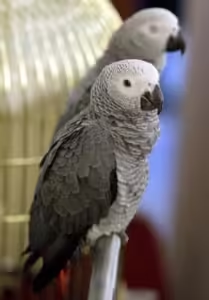
Caring for Exotic Pets: A Beginner’s Guide
Exotic pets, such as reptiles, birds, and small mammals, offer unique companionship and fascinating experiences. These pets come with their own set of care requirements and challenges. In this comprehensive guide, we’ll explore the world of exotic pets, providing essential care tips and information on their unique needs. Whether you’re a seasoned exotic pet owner or considering bringing one into your home, this guide will help ensure a happy and healthy life for your unusual companions.
Exploring Exotic Pets:
Exotic pets can bring joy and intrigue to your life, but they also require specialized care. Here are some key areas to consider for reptiles, birds, and small mammals:
Reptiles:

Housing: Reptiles need specific enclosures that mimic their natural habitats. This includes proper heating, lighting, and humidity levels. For example, bearded dragons require basking spots with UVB lighting, while snakes often need secure, escape-proof enclosures with appropriate substrate.
Diet: Each reptile species has distinct dietary needs. Some, like iguanas, are herbivores, requiring a diet of leafy greens and vegetables. Others, like geckos, are insectivores and need a diet of live insects.
Handling: Reptiles can be sensitive to handling, and it’s crucial to learn the proper techniques to avoid stress or injury. Regular, gentle handling can help some species become more accustomed to human interaction.
Birds:

Housing: Birds need spacious cages with room to fly, climb, and play. Ensure the cage is equipped with perches, toys, and enrichment items to keep them mentally stimulated.
Diet: A balanced diet for birds includes seeds, pellets, fresh fruits, and vegetables. Some birds, like parrots, also enjoy nuts and cooked grains. It’s important to research the specific dietary needs of your bird species.
Socialization: Birds are highly social animals and require regular interaction with their human caregivers. Spend time talking to, playing with, and training your bird to keep them happy and engaged.
Small Mammals:

Housing: Small mammals, such as guinea pigs, hamsters, and ferrets, need appropriately sized cages with bedding, hiding spots, and exercise areas. For instance, guinea pigs require ample space to move around and multiple levels for exploration.
Diet: Small mammals have varied diets. Guinea pigs need a constant supply of hay, fresh vegetables, and vitamin C supplements. Hamsters thrive on a mix of seeds, grains, and occasional fruits or vegetables.
Enrichment: Providing toys, tunnels, and interactive playtime is essential for the mental and physical well-being of small mammals. Ferrets, in particular, need plenty of out-of-cage time to explore and play.
Unique Needs of Exotic Pets:
Understanding the unique needs of exotic pets is crucial for their well-being. Here are some additional considerations:
Veterinary Care: Exotic pets require specialized veterinary care. It’s important to find a vet experienced in treating reptiles, birds, and small mammals. Regular check-ups can help catch potential health issues early.
Environmental Enrichment: Providing a stimulating environment with plenty of activities and challenges is vital. This includes climbing structures for birds, hiding spots for reptiles, and interactive toys for small mammals.
Lifespan and Commitment: Exotic pets often have long lifespans. Parrots, for example, can live for several decades, while some reptiles can live for 20 years or more. Consider the long-term commitment before bringing an exotic pet into your home.
Conclusion:
Caring for exotic pets like reptiles, birds, and small mammals requires specialized knowledge and attention. By understanding their unique needs and providing proper housing, diet, and enrichment, you can ensure a happy and healthy life for your exotic companion. Whether you’re captivated by the charm of a parrot, the mystery of a snake, or the playfulness of a ferret, investing time and effort into their care will lead to a rewarding and fulfilling relationship.
For more information on providing optimal nutrition for your exotic pet, check out our guide to pet nutrition. Additionally, if you’re considering adding a new pet to your family, explore our comprehensive guide to pet adoption for valuable insights and tips.




